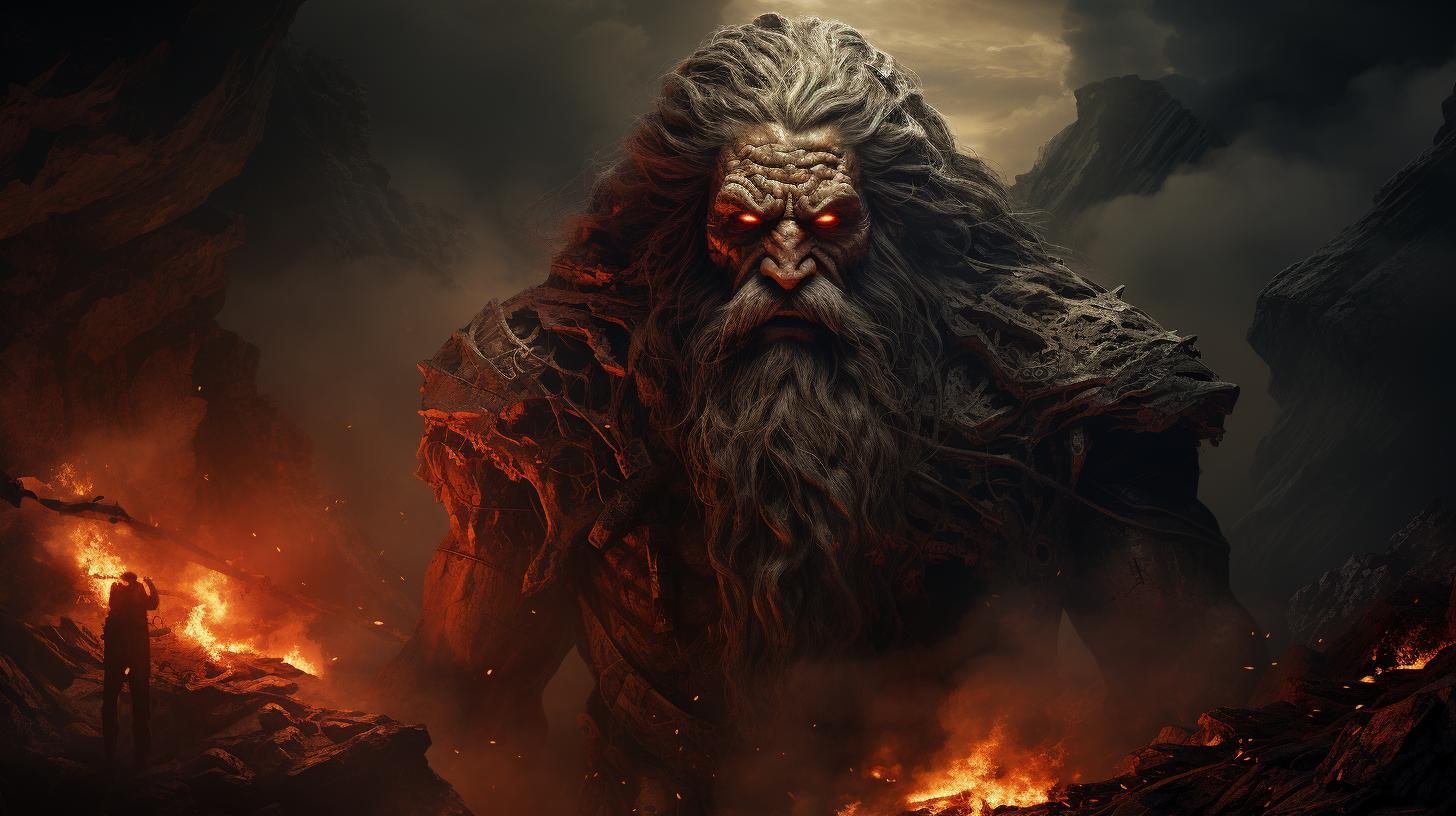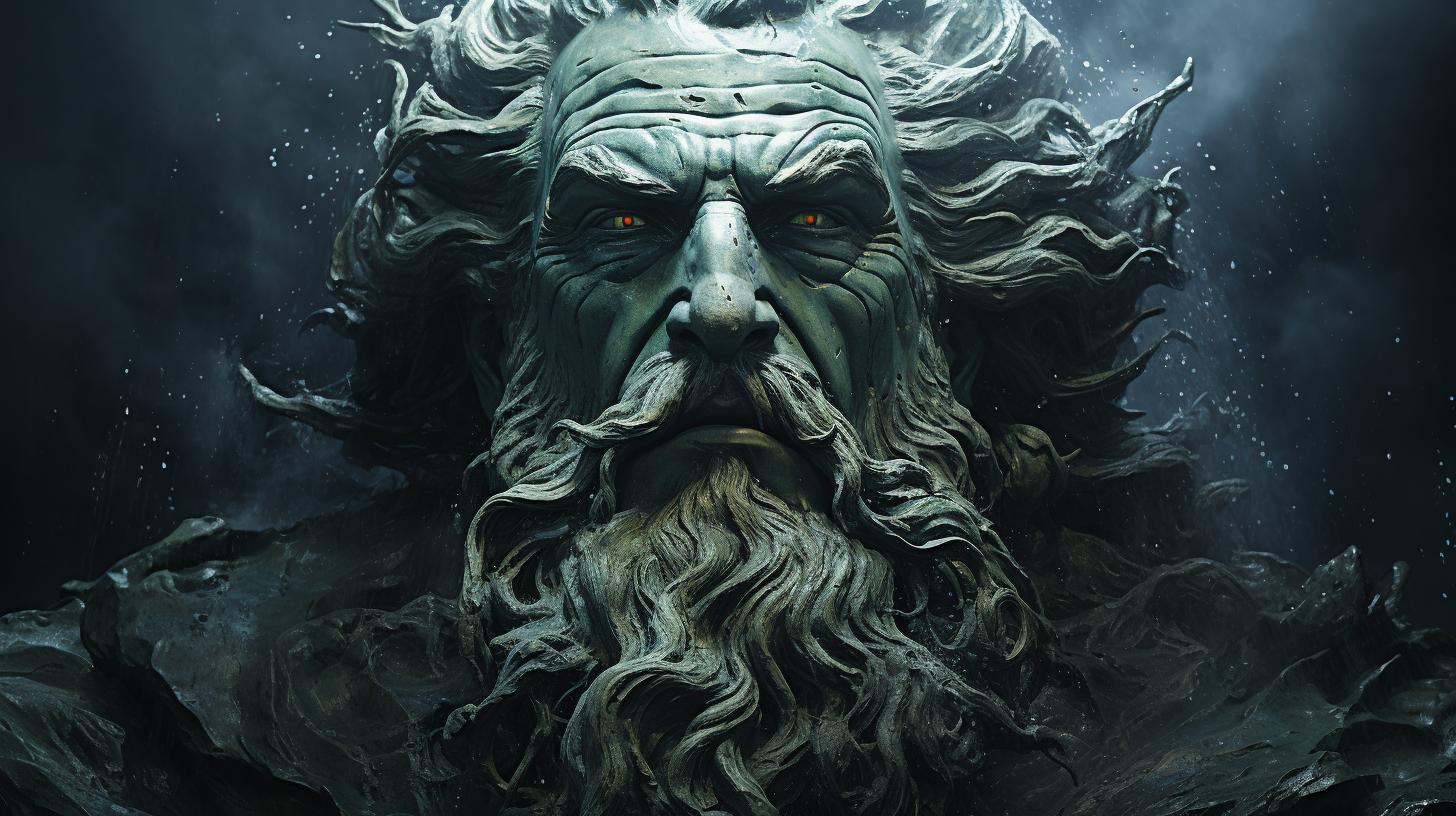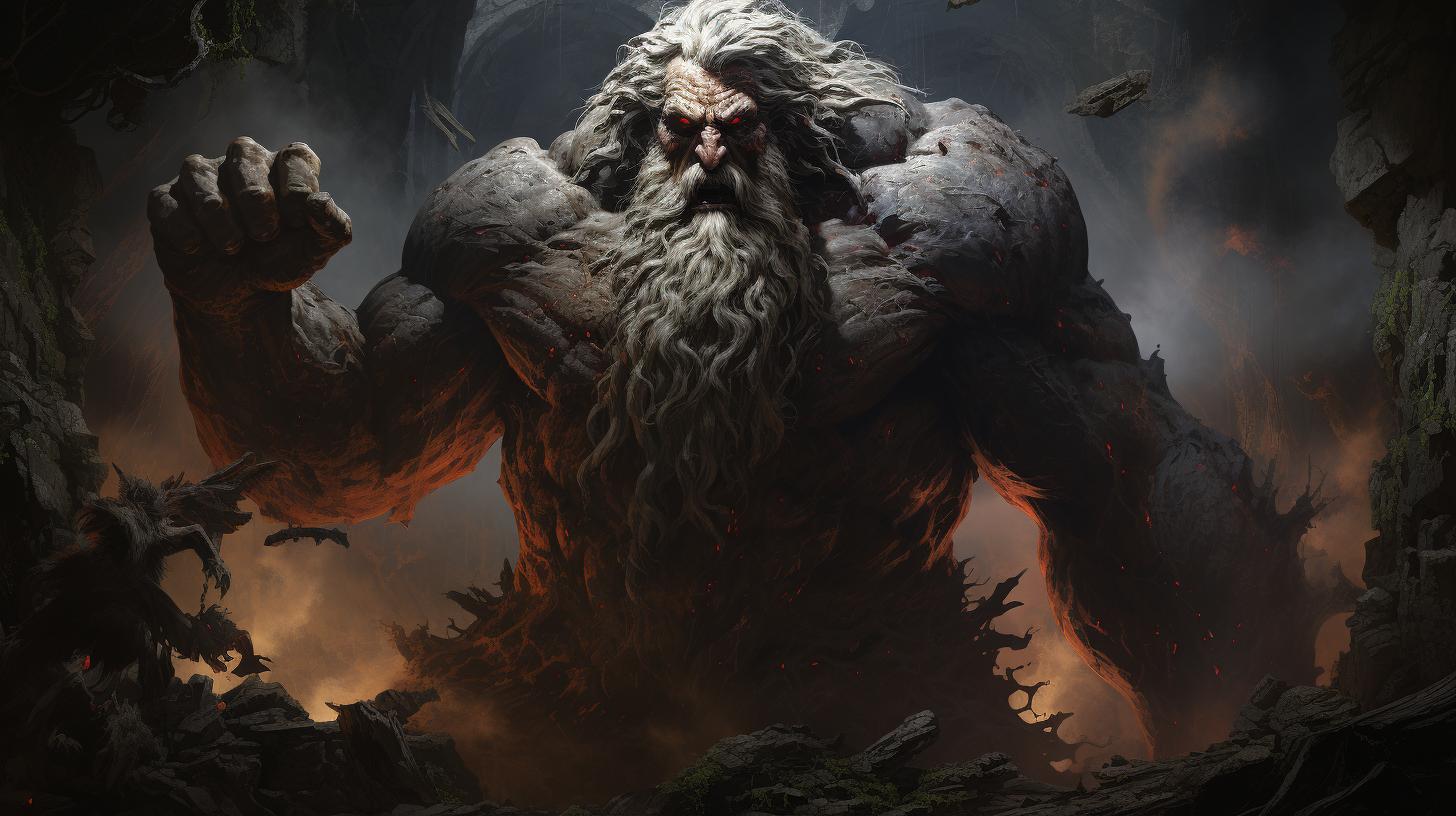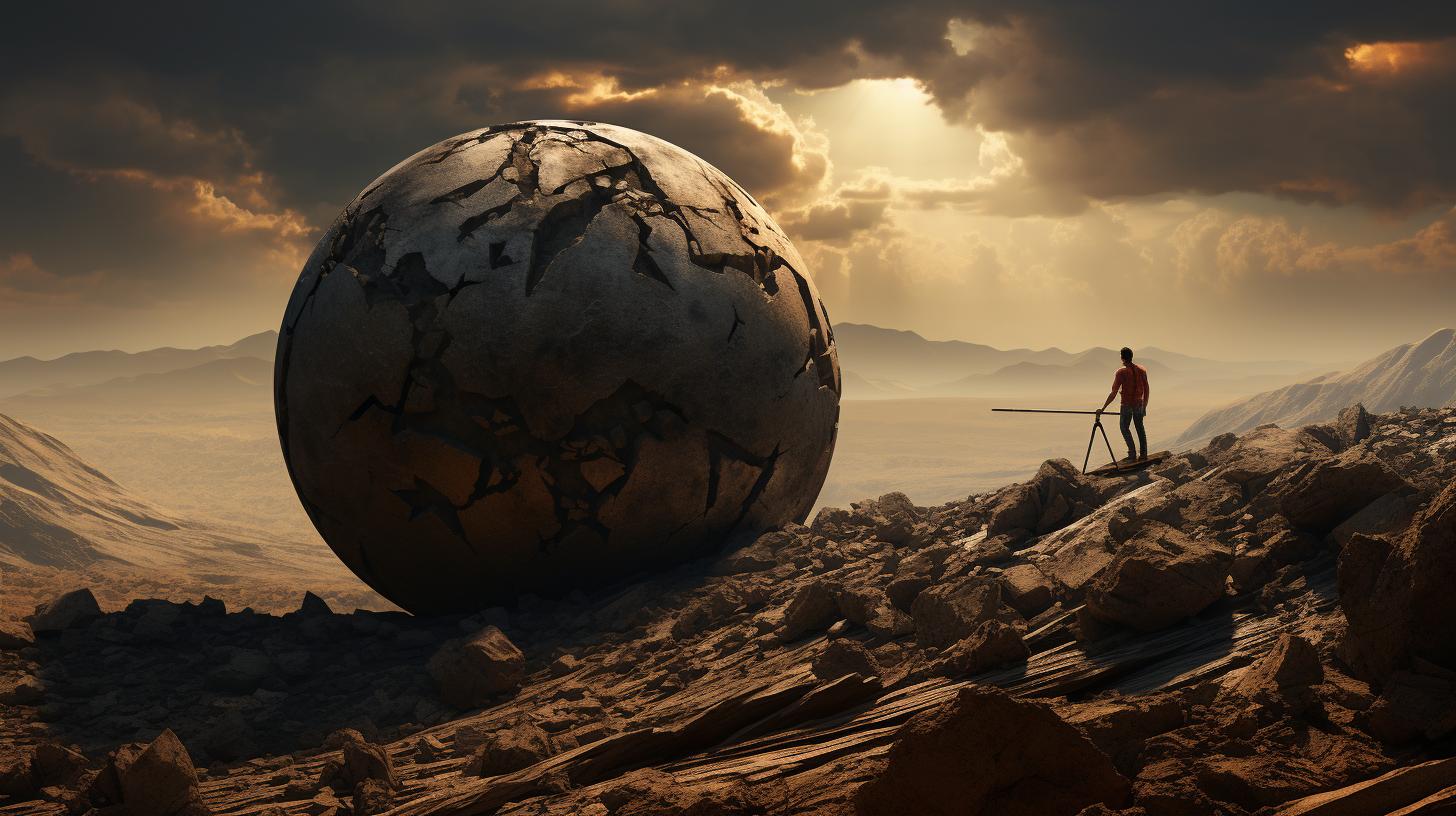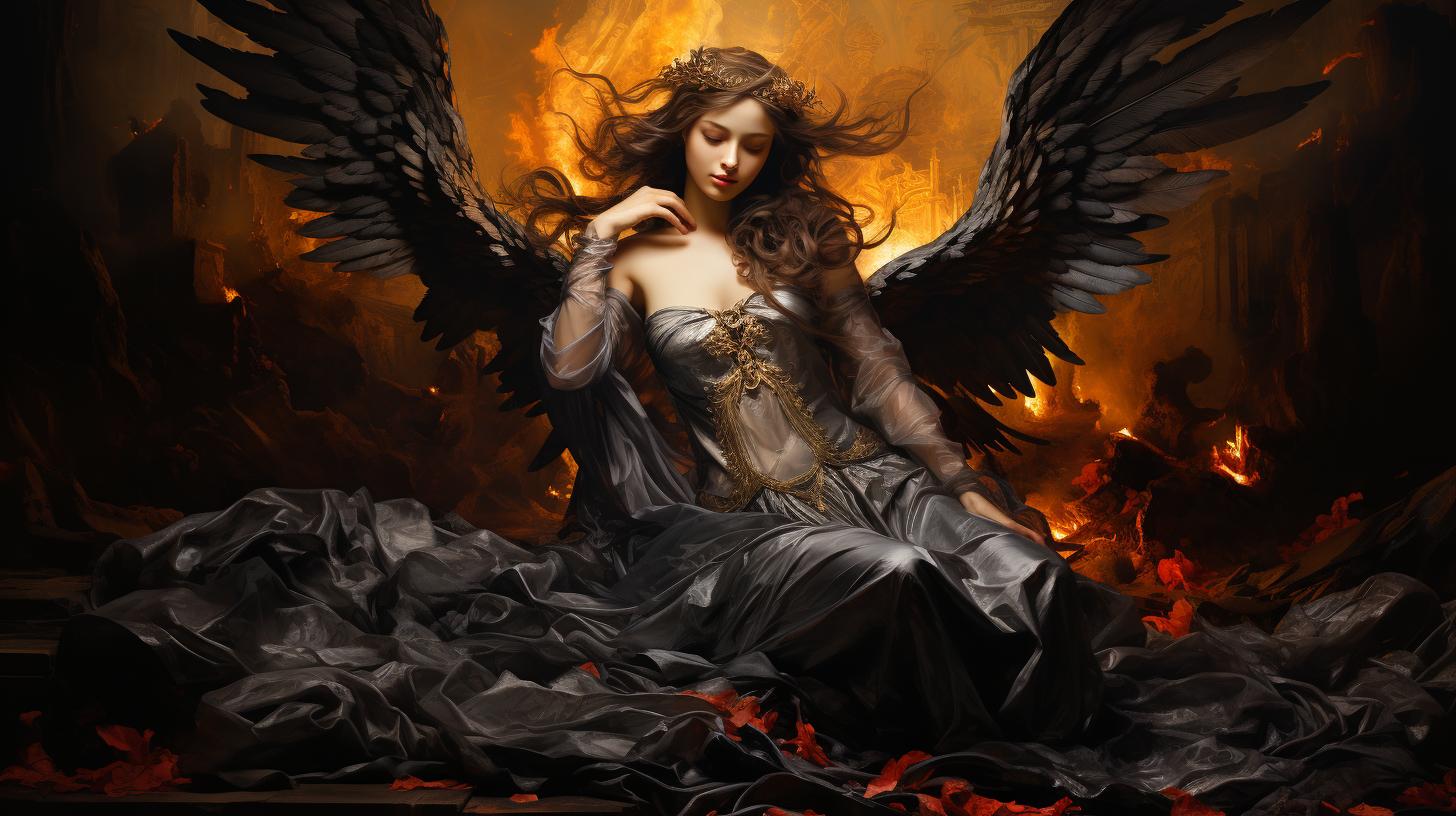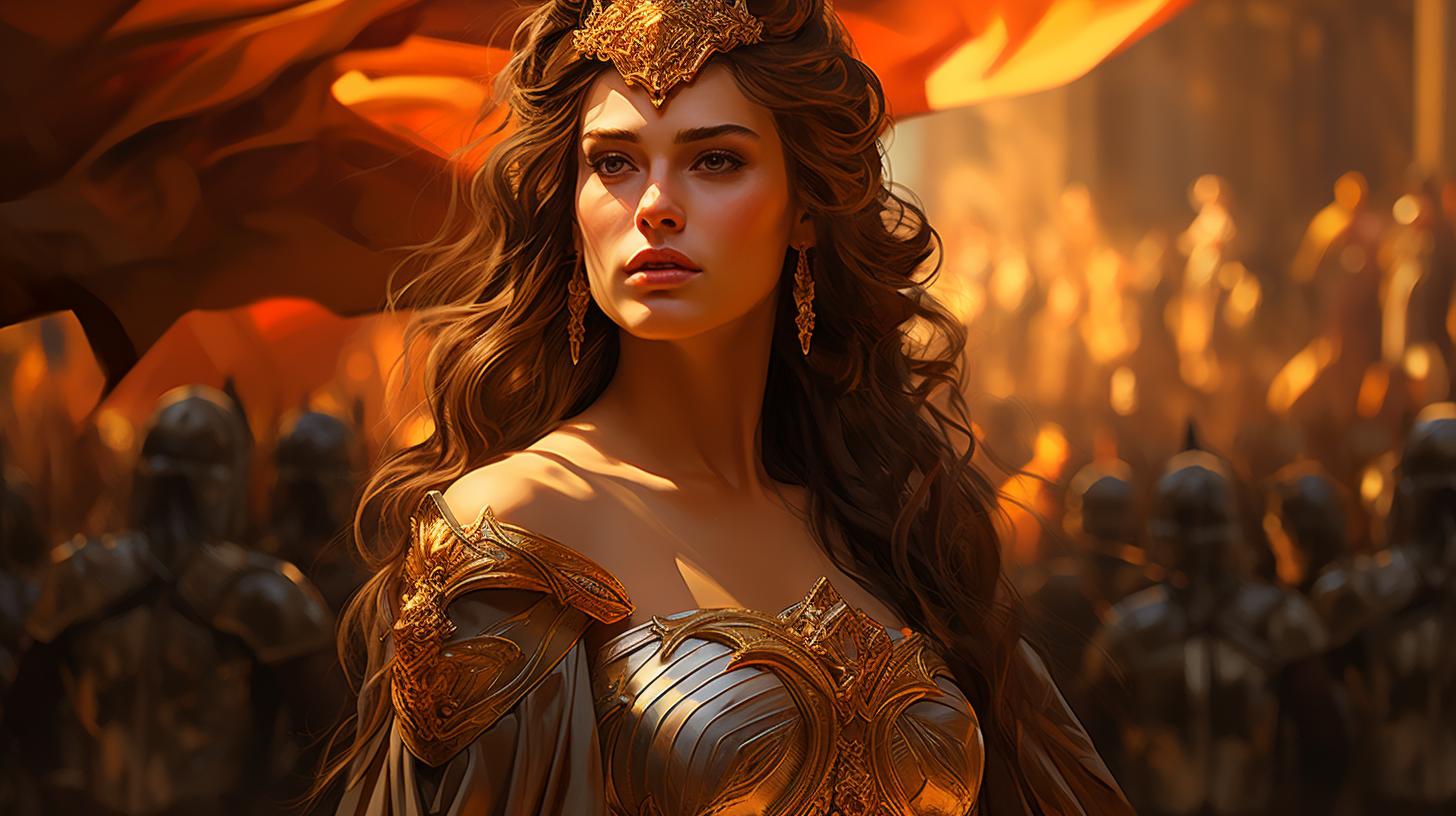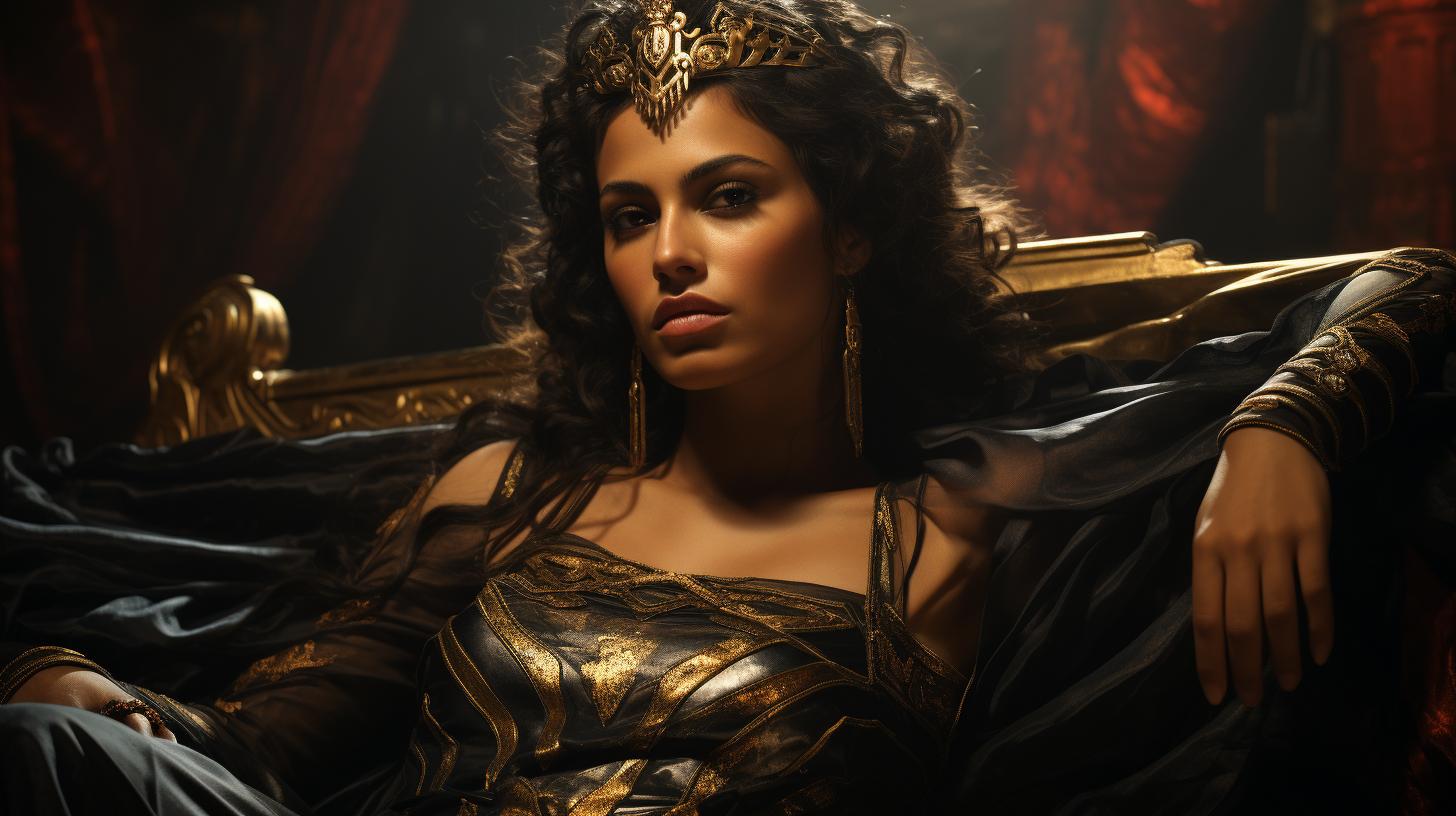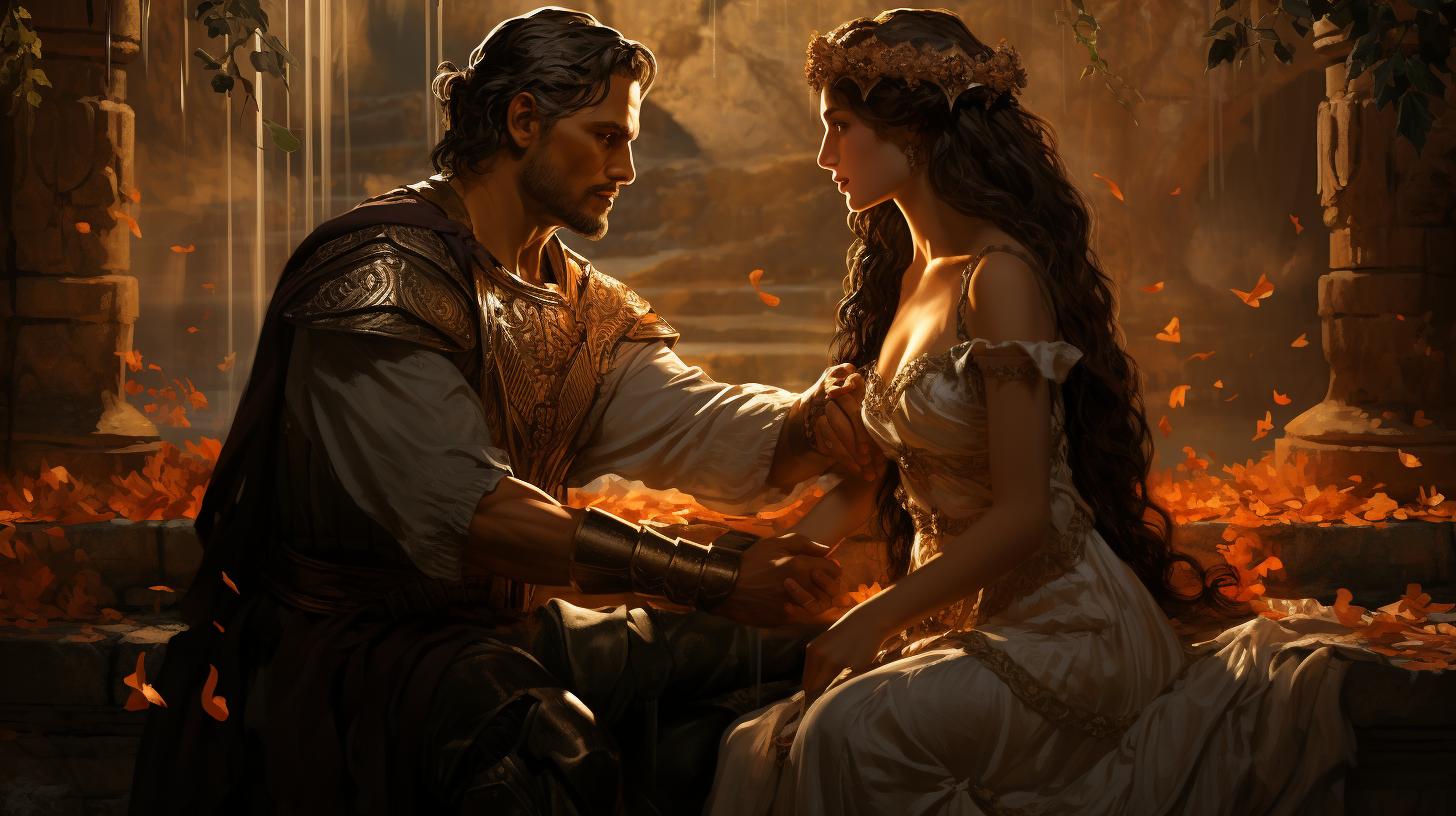Porphyrion Greek Mythology: The Powerful Giant who Challenged the Gods
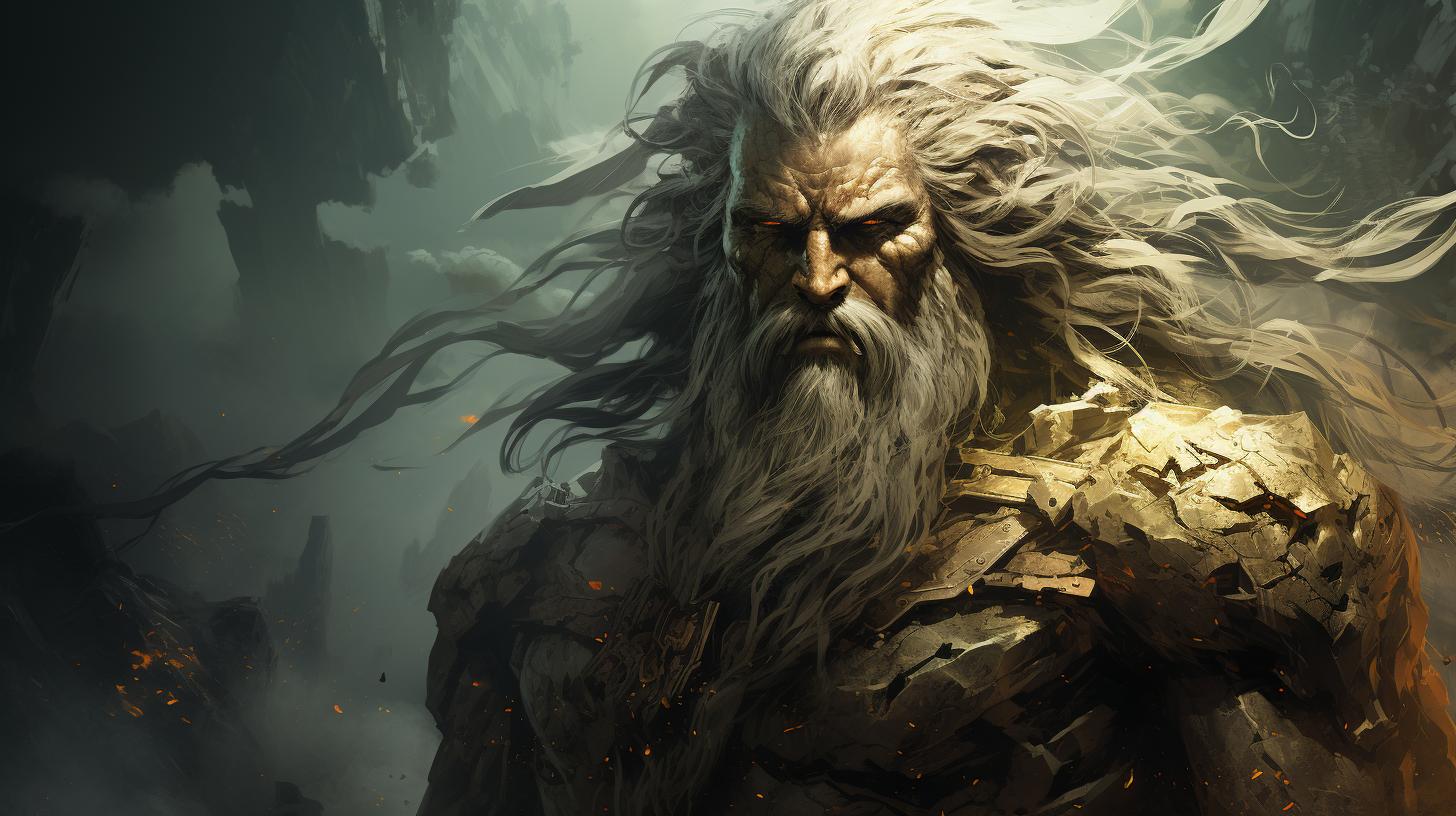
Porphyrion, a prominent figure in Greek mythology, was the king of the giants and a formidable opponent to the Olympian gods. He played a crucial role in the Gigantomachy, a fierce war between giants and gods.
Porphyrion’s audacious attempt to violate Hera and his grand plans to launch the island of Delos against the gods showcased his relentless defiance. However, he was ultimately defeated by Zeus and Heracles, leading to his demise.
Porphyrion’s epic battles and his adaptation in popular culture make him an intriguing character in Greek mythology.
The Origins of Porphyrion: Blood of Urano and Gaia or Erebos and Nyx?
Porphyrion, the prominent figure in Greek mythology, has conflicting accounts of his origins.
According to different versions of the story, he was believed to be the son of either the union of Urano (Sky) and Gaia (Earth) or that of Erebos (Darkness) and Nyx (Night).
These diverse lineage variations add an air of mystery and ambiguity to Porphyrion’s background.
Some ancient texts also mention a possible connection between Porphyrion and Eurymedon, the king of giants mentioned in Homer’s Odyssey.
However, the exact nature of this relationship remains uncertain.
The etymology of Porphyrion’s name is equally intriguing. It has been linked to various meanings, including “Agitado” (Agitated), “Brillando Oscuro” (Shining Dark), or “Coot Púrpura” (Purple Coot).
While the exact lineage and origins of Porphyrion may be subject to interpretation, there’s no denying his significance as the king of the giants in Greek mythology. His powerful role and participation in the Gigantomachy, as well as his audacious actions against the gods, make him a captivating figure in ancient tales.
Porphyrion’s Role as the King of the Giants
Porphyrion, a prominent figure in Greek mythology, held the prestigious title of the king of the giants. As the ruler of the giant race in Pallene, he commanded his species and led them into the climactic battle known as the Gigantomachy.
Considered the most powerful among the giants, Porphyrion possessed immense strength and unmatched abilities that made him a formidable adversary to the Olympian gods.
Revered by his kind, Porphyrion assumed the role of a leader in the war against the celestial deities.
With his strategic prowess and commanding presence, he instilled a sense of unity and determination among the giant army. Porphyrion’s tactical skills and unwavering spirit made him the natural choice to lead his species in their audacious defiance against the Olympians.
His extraordinary capabilities were rooted in his lineage, although various versions of his parentage exist in different accounts. Porphyrion was believed to be the son either of the primordial couple, Uranus and Gaia, or the primeval deities Erebos and Nyx. Regardless of his origins, he fulfilled his destiny as the mighty king of the giants, commanding their loyalty and respect.
While the Gigantomachy ultimately resulted in the triumph of the Olympian gods, Porphyrion’s unwavering determination and audacity left an indelible mark on the annals of Greek mythology. Despite his eventual defeat at the hands of Zeus and Heracles, his role as the king of the giants ensured that his legacy would endure throughout the centuries, captivating the imagination of generations to come.
The Gigantomaquia: Porphyrion’s Defiance Against the Olympian Gods
Porphyrion, the powerful king of the giants, played a significant role in the Gigantomachy, a great battle between the giants and the Olympian gods. In this epic war, Porphyrion led his army of giants in a relentless pursuit to challenge and overthrow the divine rule.
With his incredible strength and leadership, Porphyrion became a formidable opponent to the Olympian gods. He fearlessly stood against the power of Zeus, the king of gods, and the might of Heracles, the renowned hero.
Despite the gods’ superior powers, Porphyrion’s audacity brought chaos to the battlefield. He launched fierce assaults, aiming to dismantle the divine order and claim victory for the giants. Porphyrion’s defiance was a direct threat to the gods’ authority and their control over the cosmos.
However, Zeus, renowned for his thunderbolt, and Heracles, known for his exceptional might, joined forces to confront and defeat Porphyrion. Together, they unleashed their immense powers and strategically fought against him, ultimately overpowering the mighty king of the giants.
The gods’ triumph over Porphyrion marked a pivotal moment in the Gigantomachy, solidifying their dominance and securing their reign over the cosmos. It was a testament to the indomitable strength and sheer will of the Olympian gods in the face of great adversity.
Porphyrion’s defiance against the Olympian gods in the Gigantomachy left a lasting legacy, a reminder of the enduring struggle between divine order and chaos. His role in this epic battle showcases the power and courage of the giants, as well as the resilience and ultimate victory of the Olympian gods.
Porphyrion’s Audacious Attempt to Violate Hera
Porphyrion, the mighty king of the giants, displayed his audacity during the Gigantomachy by attempting to violate Hera, the queen of the gods. In this brazen act, Porphyrion sought to defy the authority of the Olympians and assert his dominance over them.
According to various accounts, Porphyrion’s actions unfolded in the midst of the fierce battle between the giants and the gods. In one version, he boldly approached Hera, intending to force himself upon her and assert his power.
This act of violating the queen of the gods was seen as an extreme act of disrespect towards the divine order.
However, the audacious giant’s plans were swiftly thwarted by the intervention of Zeus, the king of the gods.
Zeus, outraged by Porphyrion’s insolence, unleashed his thunderbolt upon him, striking the giant down with a powerful bolt of lightning.
The defeat of Porphyrion served as a reminder of the unwavering power of the Olympians and their ability to maintain order in the face of such audacious challenges.
It showcased the consequences that awaited those who dared to transgress the boundaries set by the gods.
Despite being a crucial moment in the Gigantomachy, Porphyrion’s audacious attempt to violate Hera is just one of the many remarkable events that unfolded during this epic battle between the giants and the Olympian gods.
Porphyrion’s Grand Plans: Launching the Island of Delos
Porphyrion, the powerful king of the giants, held grand ambitions during the Gigantomachy. One of his audacious plans involved launching the sacred island of Delos against the Olympian gods. Delos, a significant religious site, held immense symbolism and was home to the birthplace of Artemis and Apollo. Porphyrion sought to harness this sacred power and wield it against the gods in his quest for victory.
The notion of launching an entire island highlights Porphyrion’s extraordinary strength and his relentless determination to challenge the divine order. This scheme was a direct attack on the gods, as it aimed to use their own sacred spaces against them.
Porphyrion’s audacious plot demonstrated his strategic thinking and willingness to go to extreme lengths to attain victory in the war against the Olympians.
However, Porphyrion’s ambitious plan was met with swift retaliation from Zeus and the heroes of Olympus. Their combined might and divine powers proved insurmountable, and they swiftly thwarted Porphyrion’s scheme.
The significance of this event in the Gigantomachy cannot be understated, as it served as a turning point in the battle and played a crucial role in the ultimate defeat of the giants.
The failed attempt to launch Delos stands as a testament to the gods’ unwavering strength and their ability to protect their sacred sites from the audacity of the giants.
This episode showcases the power dynamics between the divine and the monstrous forces at play, further emphasizing the significance of Porphyrion’s role in the overall narrative of Greek mythology.
Zeus and Heracles: Defeating Porphyrion
In the epic battle known as the Gigantomachy, Zeus and Heracles emerged as the heroes who would face the powerful Porphyrion.
As the king of the giants, Porphyrion led his army in a daring challenge against the Olympian gods.
Knowing the threat Porphyrion posed, Zeus, the king of the gods, unleashed his divine wrath upon the giant.
With a mighty thunderbolt, Zeus struck Porphyrion, weakening him in the midst of the fierce battle. To finish the formidable giant off, Heracles, the renowned hero and demigod, swiftly launched a fatal arrow towards Porphyrion, bringing him to his ultimate demise.
This victory over Porphyrion marked a crucial moment in the struggle between the gods and the giants. It demonstrated the indomitable power of Zeus, the ruler of Mount Olympus, and the unmatched strength and valor of Heracles. Their combined efforts ensured the triumph of the Olympians in their battle against the forces of chaos and destruction.
Representations of Porphyrion in Art: The Epic Battle against Hera, Zeus, and Heracles
Porphyrion, the formidable king of the giants, has been a popular subject in artistic representations depicting the epic battle between giant and god. Artists have captured the intensity and drama of Porphyrion’s defiance against Hera, Zeus, and Heracles in various mediums.
One common depiction shows Porphyrion engaged in a fierce struggle with Heracles. The heroic figure of Heracles, known for his immense strength, is often portrayed wielding his bow and arrow, symbolizing his role in vanquishing the mighty giant.
Another striking representation features Porphyrion facing off against Hera, the queen of the gods. Hera, revered for her wisdom and ferocity, is depicted in these artworks as a formidable adversary for the giant king.
The clash between Porphyrion and Hera symbolizes the battle between mortal and divine forces.
Zeus, the mighty king of the gods, is also a prominent figure in many artistic renderings of the battle against Porphyrion.
Artists often depict Zeus hurling thunderbolts or wielding his lightning bolt, showcasing his supreme power and authority over the giants.
These artistic portrayals highlight the grandeur and scale of the Gigantomachy, with Porphyrion as the central figure representing the formidable strength and audacity of the giants.
The intricate details and skillful craftsmanship in these artworks bring to life the ancient mythological battle that shaped the Greek pantheon.
From ancient pottery and sculptures to more contemporary paintings and illustrations, representations of Porphyrion’s epic battle against Hera, Zeus, and Heracles continue to captivate audiences, serving as a testament to the enduring fascination with Greek mythology and its larger-than-life characters.
Porphyrion in Popular Culture: Adaptations in Books, Movies, and Television
Porphyrion, the formidable giant king of Greek mythology, has left a lasting impact on popular culture with various adaptations in books, movies, and television. His gripping story and epic battles have captivated audiences across different platforms.
Books
- Percy Jackson series: Porphyrion’s presence is felt in Rick Riordan’s beloved books, particularly in the Percy Jackson and the Olympians, Heroes of Olympus, Kane Chronicles, Magnus Chase, and Trials of Apollo series.
Readers are introduced to the larger-than-life character and his pivotal role in the war against the gods.
Movies
- The Lightning Thief: Based on Rick Riordan’s first book, this film adaptation introduces Porphyrion as a formidable adversary and showcases his attempts to challenge the gods.
- The Sea of Monsters: In this sequel, Porphyrion’s legacy continues as the characters confront the ongoing threat posed by the giant king.
Television
- TV Series: Porphyrion’s mythological presence has also made its way to the small screen.
While the specifics of his appearances may vary, his role in the Gigantomachy and his clashes with the gods are prominently featured.
These adaptations bring Porphyrion’s larger-than-life character to a wider audience, allowing them to experience the thrilling battles and audacious challenges he posed to the gods.
From the pages of popular books to the big and small screens, Porphyrion’s story continues to resonate with viewers of all ages, further establishing him as a legendary figure from Greek mythology.
Frequently Asked Questions about Porphyrion Greek Mythology
What are the possible origins of Porphyrion?
According to different versions of the myth, Porphyrion could be the son of either Urano and Gaia or Erebos and Nyx. The exact parentage of Porphyrion remains a subject of debate among scholars and mythologists.
What was Porphyrion’s role as the King of the Giants?
Porphyrion was revered as the most powerful of the giants and held the title of their king. He led the giant army against the Olympian gods during the Gigantomachy, a legendary battle of epic proportions.
What was the Gigantomachy, and how did Porphyrion defy the Olympian gods?
The Gigantomachy was a mythological war between the giants and the Olympian gods. Porphyrion took on the audacious challenge of leading the giant army, defying the gods and seeking to overthrow their rule over Olympus.
What audacious act did Porphyrion attempt against Hera?
Porphyrion’s audacity reached its peak when he attempted to violate the goddess Hera on the battlefield. This heinous act further fueled the gods’ determination to defeat the giants and defend their divine sovereignty.
Did Porphyrion have grand plans beyond his assault on Hera?
Yes, Porphyrion’s grandiose ambitions extended beyond his attack on Hera. In some accounts, he aimed to launch the entire island of Delos against the gods, intending to disrupt their order and assert his dominance.
How were Porphyrion ultimately defeated?
The mighty Zeus, ruler of the gods, struck Porphyrion with a powerful lightning bolt, rendering him vulnerable. Heracles, the hero of Greek mythology, then delivered the fatal blow by piercing Porphyrion’s heart with an arrow, ending his reign of terror.
Are there any artistic representations of Porphyrion’s battles?
Indeed, various artistic depictions portray the epic battles involving Porphyrion. These artworks showcase his intense conflicts against formidable opponents such as Heracles, Hera, and Zeus, capturing the magnitude of the Gigantomachy.
How has Porphyrion been portrayed in popular culture?
Porphyrion’s captivating presence in Greek mythology has inspired adaptations in popular culture. Books like Percy Jackson, Heroes of Olympus, Kane Chronicles, Magnus Chase, and Trials of Apollo have introduced his character to a new generation.
Film adaptations, such as The Lightning Thief and The Sea of Monsters, along with related television series and graphic novels, have also brought Porphyrion’s mythological exploits to life.
.











